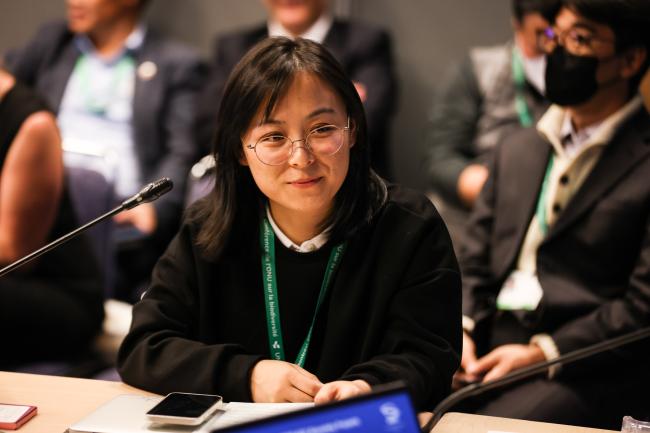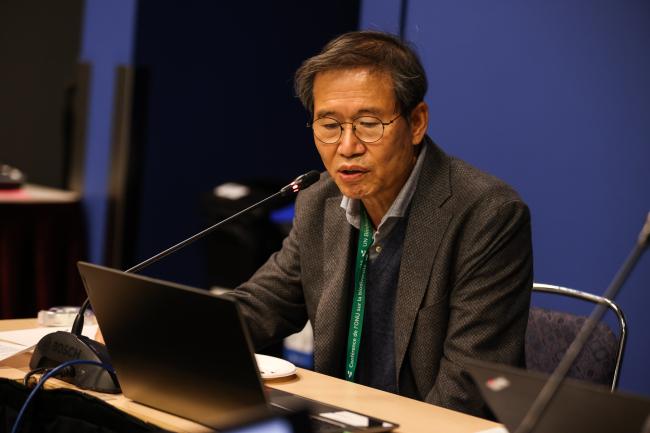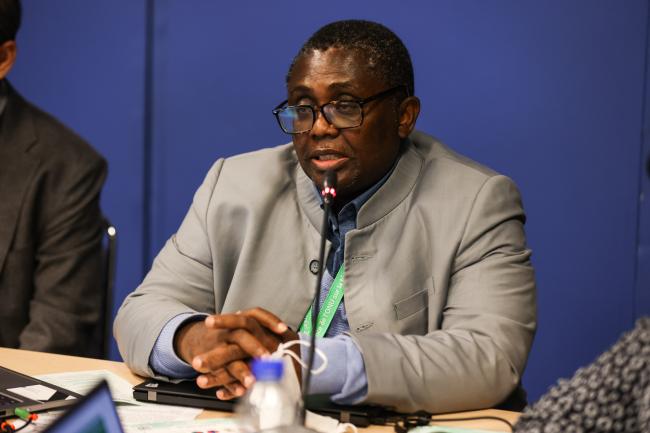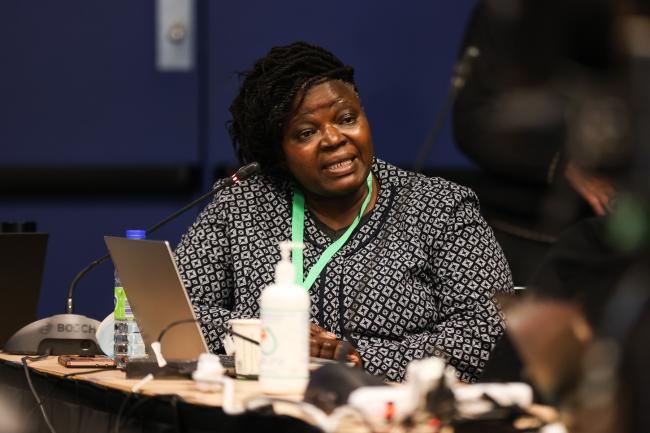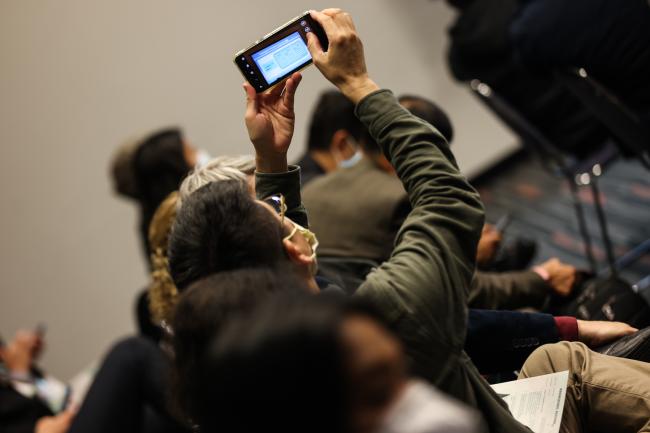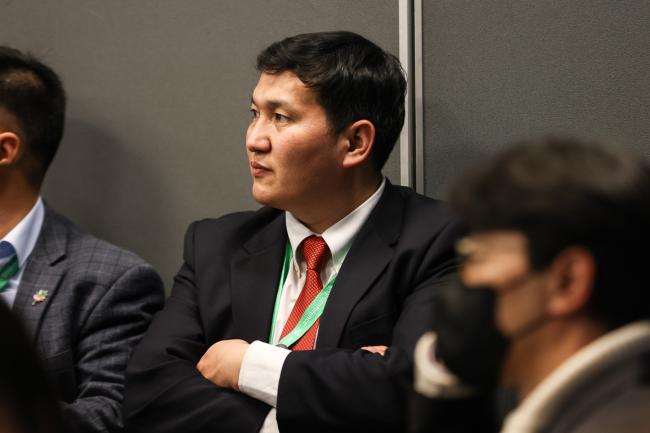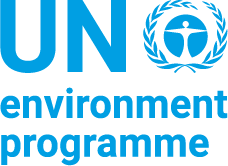About
Speakers from Mongolia, the Philippines, India, Bangladesh, Korea Institute for Promoting Asia Biosafety Cooperation, and UNEP shared how they are jointly strengthening the implementation of the Cartagena Protocol on Biosafety
This side event provided a platform to share ongoing joint efforts between Mongolia, the Philippines, India, Bangladesh, the Korea Institute for Promoting Asia Biosafety Cooperation (KIPABiC), and the UN Environment Programme (UNEP) on strengthening implementation of the Cartagena Protocol on Biosafety. It showcased efforts to contribute to cooperation at the regional and sub-regional levels by implementing joint projects to maximize synergies and opportunities for sharing experiences, information, and expertise.
Tashi Yangzom, KIPABiC, moderated the session. Homin Jang, Chief Director, KiPABiC, presented on regional cooperation and collaboration in Asia, providing an update on a project promoting the safe application of biotechnology through multi-country cooperation in the implementation of National Biosafety Frameworks in Asia. He underscored the partnership between the KiPABiC and UNEP, stating that living modified organism (LMO) usage is on the rise but noting that countries in Asia are at different stages of Biosafety Protocol implementation. He noted that in 2020, the Institute initiated efforts to sustain its work beyond 2020, sharing that KiPABiC consulted with UNEP to help refocus the project, which created new regional projects that were endorsed by the Global Environment Facility (GEF).
Alex Owusu-Biney, UNEP, shared reflections on multi-country cooperation as it relates to the Biosafety Protocol, noting that all Protocol articles are legally binding and lamenting that Article 14 (on cooperation) has not been well implemented. He underscored that Parties can come together to harmonize their processes, handling issues jointly where there are commonalities. He stressed that the Protocol is a transboundary instrument, but implemented by national entities, and underscored the need for cooperation to fully implement it. He highlighted capacity-building opportunities, including how to incorporate biosafety needs into National Biodiversity Strategies and Action Plans (NBSAPs) and into a future post-2020 global biodiversity framework (GBF). He also underscored the potential for party-to-party funding, which is outside the remit of GEF funding.
Song Youngjin, Ministry of Trade, Industry and Energy, Republic of Korea, via video, introduced his Ministry’s work as the primary implementing agency of the Biosafety Protocol, underlining the importance of biosafety with respect to human health and the environment. He noted the complexity of the transboundary nature of LMOs and underscored the need for joint, concerted efforts to ensure implementation of the Protocol. He highlighted regional meetings convened by the Republic of Korea, drew attention to the Biosafetry Clearing-House mechanism, and lauded the establishment of the Asia Biosafety Family.
Doreen Mnyulwa, Executive Director, Regional Agricultural and Environmental Innovations Network Africa (RAEIN-Africa), highlighted that RAEIN-Africa works by inter-country cooperation on biosafety, including through facilitating capacity building across the biosafety sector. She also highlighted the Multi-Country Project to Strengthen Institutional Capacities on LMO Testing in Support of National Decision Making (MCP-ICLT), which involves 11 countries in southern Africa. She described the LMO detection capacity development process, and underlined the need for States to be owners of the projects and to integrate lessons learned. She also highlighted the importance of balancing lessons learned from different countries at different stages of Biosafety Protocol implementation.
Michelle John, University of the West Indies, St. Augustine, via video, highlighted the differing opinions on the potential threats of biotechnology, but stated that the Caribbean region agrees on the need to implement the Biosafety Protocol. She mentioned the UNEP/GEF project, involving 13 countries, to establish practical and transparent regulatory biosafety regimes. She noted the achievement of harmonization through the establishment of a regional biosafety approach, but shared that a one-size-fits-all approach was adopted, assuming that all countries were at the same level of Protocol implementation. She said that, going forward, the region will, among others, enlist greater support from regional entities, and cluster countries based on strategic interests relevant to their national development objectives.
Sharing country reflections, Bangladesh welcomed further cooperation to implement the GBF, especially on issues related to the Biosafety Protocol and new issues such as synthetic biology. India reiterated the country’s commitment to implement the Biosafety Protocol, and called attention to the implementation of two GEF-funded projects. Mongolia, as a member of the Asia Biosafety Family, called attention to the country’s implementation of several GEF-funded projects and pointed to the creation of a national committee to ensure the sustainability of the projects.
The Philippines underscored that the Protocol’s relevance has increased due to new technological developments, welcomed the spirit of cooperation among Asian countries led by the Republic of Korea, and highlighted the role her country has played in regional cooperation. The Republic of Korea reiterated the importance of regional cooperation as a key to build capacity in the field of biosafety and welcomed the new GEF-funded regional cooperation project. In the ensuing discussion, some participants called for more information on the development of genetically-modified organism samples for field testing, calling for cooperation to go beyond capacity building.
Organized by: the Philippines, India, Mongolia, Bangladesh, the Republic of Korea, UNEP, and KiPABiC
Contact: Tashi Yangzom, KIPABiC tashi.kipabic@gmail.com
For more information: https://www.cbd.int/side-events/4573
Written and edited by Tallash Kantai, Vijay Kolinjivadi, PhD, and Deborah Davenport, PhD.
All ENB photos are free to use with attribution. For this event, please use: Photo by IISD/ENB | Natalia Mroz
To receive free coverage of global environmental events delivered to your inbox, subscribe to the ENB Update newsletter.


